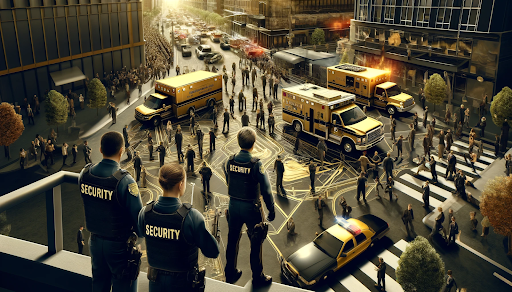In times of crisis, the role of security personnel is indispensable. From natural disasters to unforeseen security breaches, their quick thinking and strategic actions can safeguard lives and properties. For property managers, chief security officers, and security company hiring managers, understanding these critical roles is crucial in training and employing a competent security team. This blog post aims to unpack the diverse responsibilities of security personnel during emergencies, using a conversational yet concise tone that caters specifically to industry professionals.
Understanding the Security Personnel's Role
Security personnel are often the first responders to any emergency within their patrol areas. Their primary responsibilities can be summarized as follows:
-
Assessment of the Situation: Quickly understanding the nature of the crisis to take appropriate action.
-
Immediate Response: Acting swiftly to mitigate the impact of the crisis.
-
Communication: Keeping all stakeholders informed about the situation and ongoing responses.
-
Crowd Management: Controlling the movement of people to ensure safety and prevent chaos.
-
Coordination with Emergency Services: Working alongside police, fire departments, and medical personnel.
-
Post-Event Analysis: Participating in debriefing sessions to improve future responses.
1. Quick and Accurate Assessment
In a crisis, the ability to assess the situation accurately and quickly is paramount. Security personnel must identify the nature of the emergency—whether it's a fire, an active shooter, or a severe weather event—and determine the potential risks involved. This initial assessment is crucial in defining the subsequent steps and the overall response strategy.
2. Immediate Actions and Response
Once the situation is assessed, security personnel must act immediately to protect life and property. This may involve:
-
Evacuating the area: Leading people to safety in an orderly fashion.
-
Securing the premises: Locking down facilities to prevent unauthorized access or contain hazards.
-
Providing first aid: Assisting injured individuals until medical help arrives.
3. Effective Communication
Clear communication during a crisis is vital. Security teams must:
-
Inform: Update property managers and relevant authorities about the situation.
-
Instruct: Tell people in the area what to do to stay safe.
-
Reassure: Keep everyone calm, preventing panic and confusion.
4. Crowd Control and Management
Managing crowds during an emergency can prevent additional injuries and damages. Security personnel need to:
-
Direct flows: Guide people away from danger to designated safe zones.
-
Manage access points: Control who enters or exits sensitive areas to maintain order and safety.
-
Ease congestion: Ensure that evacuation routes and emergency accesses are clear.
5. Collaboration with Emergency Services
Coordination with local law enforcement and emergency responders is critical. Security personnel should:
-
Share information: Provide detailed updates to arriving emergency services.
-
Support their efforts: Assist with operations as needed, following the directives of the authorities.
-
Facilitate operations: Ensure that emergency teams can access the site and conduct their duties without hindrance.
6. Learning and Improvement Post-Crisis
After the crisis, security teams should engage in thorough debriefing sessions. These are essential to:
-
Review actions: Analyze the effectiveness of the response.
-
Identify improvements: Note what worked well and what could be enhanced.
-
Update plans: Revise emergency protocols based on recent experiences.
.png)
.png)
.png)

.png)
.png)

.png)
.png)
.png)
.png)
